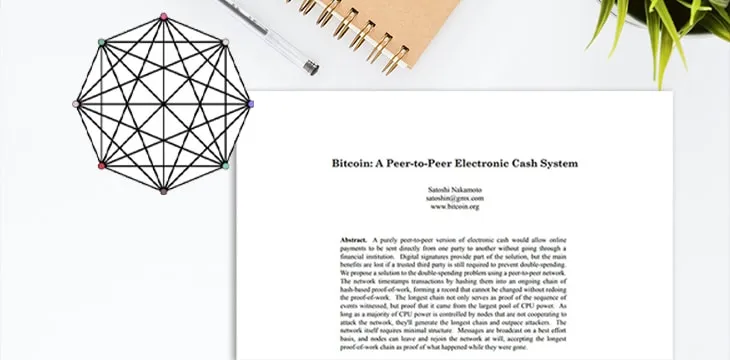|
Getting your Trinity Audio player ready...
|
This episode of “Theory of Bitcoin” is all about how Bitcoin can store data more efficiently, while still keeping transactions secure. Bitcoin creator Dr. Craig S. Wright and Fabriik Smart Wallet’s Ryan X. Charles talk about simplified payment verification (SPV), blockchain data pruning, and ways potential problems might be handled in the future.
This is “all about not having to hold everything forever,” Dr. Wright says.
Yes, Simplified Payment Verification (SPV) is detailed in the white paper. It’s not a recent idea. Despite this, no widely-used wallet or other Bitcoin software has made use of this process. Dr. Wright often touts its benefits but it’s still an idea yet to be properly explored in the Bitcoin industry.
The idea is that only the headers from each transaction block need to be stored long-term (how long that is depends on the validator). For payments, and to validate information timestamped on the blockchain, SPV says a user only needs to hold records of their own spendable coins and a hashed record of the block headers.
If the block headers don’t validate, then none of the data in that block would be valid, Dr. Wright explains. Beyond that, users don’t need to keep full validation records for everyone on the planet.
Transaction processors would need to keep these records, though—and that’s why that task is going to those with massive bandwidth and data storage capacity. Even then, it’s possible some pruning will occur and processors are able to decide for themselves when/where that will be.
‘Lives forever on the blockchain’—maybe, but there are conditions
The phrase “lives forever on the blockchain” isn’t actually a guarantee built into the Bitcoin code. If only block headers are kept by processors/validators, then the actual transaction data may be discarded at some point. That’s something everyone should remember. However, as Dr. Wright says, there are plenty of incentives for processors to specialize. Some will specialize in mass storage, others in efficiency and speed. Although they will still keep full data records, the level to which that data is accessible to users may vary.
He sees a future where there’s more diversity in the transaction processing sector—and by “diversity” here we mean areas of specialization, where not every processor performs the same tasks as the others. There will be various degrees of data archiving capability. Technically, then, your data does “live forever on the blockchain,” but you might have to pay someone to make that data readily available.
So if SPV is the best way to handle Bitcoin at a massively scaled level, why are there no SPV wallets available today? Charles asks. “Everyone’s been trying to put nodes on everyone’s damn desktop,” Wright says.
Keeping Bitcoin “small”, and the old misconception that Bitcoin blocks needed to be kept small to keep the network “decentralized” have contributed to this lack of SPV development too. Bitcoin is also still in its early infancy as a data processing network, so its full benefits may not be understood until there are several large-volume users on the network.
‘Honest nodes’ and ‘attackers’
The Bitcoin white paper states:
“As such, the verification is reliable as long as honest nodes control the network, but is more vulnerable if the network is overpowered by an attacker. While network nodes can verify transactions for themselves, the simplified method can be fooled by an attacker’s fabricated transactions for as long as the attacker can continue to overpower the network.”
This leads to a discussion of what “honest nodes” and “attackers” are or could be, and Charles questions whether BTC (post-2017, in the form of BTC Core) could be considered an “attacker chain.”
BTC is actually now a separate chain, Dr. Wright says, and that opens up a new range of legal issues since that network claims to be “Bitcoin.”
If you change the protocol, you’re not Bitcoin. It’s that simple.
The BTC development team’s interference in the fundamental protocol rules began much earlier than the 2017 BTC/BCH split, he explains. The “CheckLockTimeVerify” (CLTV) opcode was added in 2015, something Dr. Wright has described as “fools that wanted to play took charge, they decided to experiment and break what they did not understand.”
The NLockTime function already existed on Bitcoin before then, but has been “broken” with other timed-transaction procedures added or removed. Doing this has invalidated transactions made using this function from the earliest days of Bitcoin (transactions that could well be relevant to Satoshi’s and other early Bitcoiners’ coins, which is a whole other issue).
If I make any transaction at all, it’s got to be valid in the future, Dr. Wright says. No financial system could be taken seriously if this is not the case, given that the timeframe for financial applications is huge—85 years, or more. Even a standard housing loan lasts about 40 years, and still needs to be kept on record years beyond that. “It has to be set in stone, there’s no other way to put it,” he says.
BSV, therefore, is the only blockchain bearing the Bitcoin name that actually follows the original rules. There is also a discussion about who has the sole legal right to set the rules, and what methods courts and governments might use to enforce this.
As usual, the discussion is peppered with interesting tidbits of Bitcoin development history (including some comments about the Alert Key system and who could use it). And also as usual, it pays to watch every “Theory of Bitcoin” episode in full. It’s the most thorough education (or review) you’re able to get, even if you think you already know all there is to know about Bitcoin. If even Ryan X. Charles learns something new every week, viewers are guaranteed to as well.
To watch previous episodes of the Theory of Bitcoin, check the Theory of Bitcoin: White Paper YouTube playlist here.

 07-09-2025
07-09-2025 





